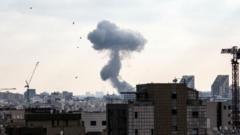The Iranian leadership stands at a crossroads following recent military provocations from Israel and the US. Historical parallels highlight the possible outcomes of defiance versus negotiation.**
The High-Stakes Dilemma: Iran's Response to Regional Pressure**

The High-Stakes Dilemma: Iran's Response to Regional Pressure**
As tensions escalate, Iran faces a critical choice: to retaliate against perceived aggression or to seek a ceasefire reminiscent of past conflicts.**
In the backdrop of rising tensions between Iran and Israel, Ayatollah Ali Khamenei is confronted with a daunting decision that could shape the future of Iran’s geopolitical posture. Mirroring a pivotal moment in 1988, when Ayatollah Ruhollah Khomeini reluctantly accepted a ceasefire during a devastating war with Iraq, Khamenei now faces a similar choice amidst mounting external pressures.
At 86 years old, Khamenei has overseen the transformation of Iran into a formidable regional power, particularly in nuclear capabilities. However, as military exchanges escalate, including Iran's recent missile strikes on Israel, the supreme leader must weigh his nation’s response carefully. The Iranian foreign ministry’s pronounced defiance reflects a fierce commitment to sovereignty and security, suggesting that a surrender to foreign demands, especially from President Trump and Prime Minister Netanyahu, may be perceived as unacceptable.
The historical context is significant; Khomeini characterized accepting defeat as “drinking from a chalice of poison,” a sentiment that resonates profoundly in Iran’s collective memory. Khamenei's potential inclination towards martyrdom rather than capitulation underscores the emotional and political weight of this moment. As Iranian forces threaten U.S. military personnel in the region, escalating retaliatory actions could further complicate an already volatile situation.
The stakes are incredibly high, not just for Iran, but for the wider Middle East as regional allies and adversaries closely monitor Khamenei's next move. Whether to escalate military responses or to consider diplomatic avenues—an arduous task given the geopolitical landscape—remains a critical question with ramifications that extend far beyond Iran's borders.
At 86 years old, Khamenei has overseen the transformation of Iran into a formidable regional power, particularly in nuclear capabilities. However, as military exchanges escalate, including Iran's recent missile strikes on Israel, the supreme leader must weigh his nation’s response carefully. The Iranian foreign ministry’s pronounced defiance reflects a fierce commitment to sovereignty and security, suggesting that a surrender to foreign demands, especially from President Trump and Prime Minister Netanyahu, may be perceived as unacceptable.
The historical context is significant; Khomeini characterized accepting defeat as “drinking from a chalice of poison,” a sentiment that resonates profoundly in Iran’s collective memory. Khamenei's potential inclination towards martyrdom rather than capitulation underscores the emotional and political weight of this moment. As Iranian forces threaten U.S. military personnel in the region, escalating retaliatory actions could further complicate an already volatile situation.
The stakes are incredibly high, not just for Iran, but for the wider Middle East as regional allies and adversaries closely monitor Khamenei's next move. Whether to escalate military responses or to consider diplomatic avenues—an arduous task given the geopolitical landscape—remains a critical question with ramifications that extend far beyond Iran's borders.























